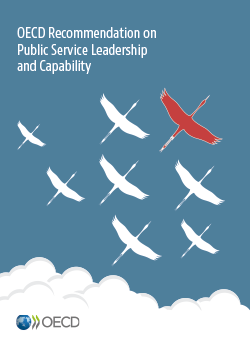Emploi et gestion publics
OECD Recommendation on Public Service Leadership and Capability
Shaping the future of work in the public sector |
|||
|
Public employees are central to modern society’s greatest achievements. They enable innovation and economic prosperity, ensure access and quality of essential public services, and protect citizens from a range of threats. However, the nature of work in the public sector is changing rapidly, and the capabilities of public servants and those who lead them are constantly required to adjust. To keep pace, governments look for new ways to develop and manage skilled, committed and trusted public workforces. The OECD Recommendation on Public Service Leadership and Capability outlines how countries can ensure that their public services are fit for purpose for today’s policy challenges, and capable of taking the public sector into the future. The Recommendation is based on a set of commonly shared principles, which have been developed through the Working Party on Public Employment and Management. The development of the Recommendation benefitted from a broad public consultation, which generated a high level of input from public servants, citizens and experts from around the world.
Download the Recommendation: |
|
||
|
The final adopted text of the Recommendation (17 January 2019) is available on the online Compendium of OECD Legal Instruments. |
|||
The 14 principles for a fit-for-purpose public service |
||||||
| Values-driven culture and leadership | Skilled and effective public servants | Responsive and adaptive public employment systems | ||||
|
1. Define the values of the public service and promote values-based decision-making. 2. Build leadership capability in the public service. 3. Ensure an inclusive and safe public service that reflects the diversity of the society it represents. 4. Build a proactive and innovative public service that takes a long-term perspective in the design and implementation of policy and services. |
5. Continuously identify skills and competencies needed to transform political vision into services which deliver value to society. 6. Attract and retain employees with the skills and competencies required from the labour market. 7. Recruit, select and promote candidates through transparent, open and merit-based processes, to guarantee fair and equal treatment. 8. Develop the necessary skills and competencies by creating a learning culture and environment in the public service. 9. Assess, reward and recognise performance, talent and initiative. |
10. Clarify institutional responsibilities for people management. 11. Develop a long-term, strategic and systematic approach to people management based on evidence and inclusive planning. 12. Set the necessary conditions for internal and external workforce mobility and adaptability to match skills with demand. 13. Determine and offer transparent employment terms and conditions that appropriately match the functions of the position 14. Ensure that employees have opportunities to contribute to the improvement of public service delivery and are engaged as partners in public service management issues. |
||||
Public consultation |
|
|
The Recommendation benefited from a broad public consultation, which generated a high level of input from public servants, citizens and experts from around the world. Governments, recruitment managers, human resource officials, international organisations, academics and private individuals were encouraged to participate to help shape the future of employment and leadership in the public sector. |
|
Documents connexes
